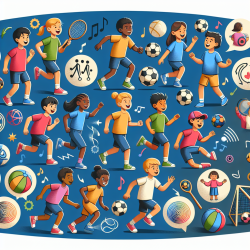Introduction
As practitioners in the field of speech-language pathology and child development, we are constantly seeking effective strategies to enhance children's overall well-being. A recent study, "Does Perceived Competence Mediate between Ball Skills and Children’s Physical Activity and Enjoyment?" provides valuable insights into how perceived competence in ball skills can significantly impact children's physical activity (PA) and enjoyment. Let's delve into the findings and explore how we can apply these insights to improve outcomes for children.
The Study in a Nutshell
The study involved 294 students with an average age of 10.96 years, assessing their actual ball skills, perceived competence, PA, and PA enjoyment. The researchers employed structural equation modeling (SEM) to explore the relationships between these variables. The results indicated that perceived competence plays a crucial mediating role between actual ball skills and children's PA and enjoyment.
Key Findings
- Actual ball skills strongly influence perceived competence.
- Perceived competence significantly predicts PA and PA enjoyment.
- Enhancing perceived competence can indirectly boost PA and enjoyment.
Implementing the Findings
For practitioners, these findings underscore the importance of fostering an environment that enhances children's perceived competence in ball skills. Here are some actionable strategies:
- Skill Development: Focus on developing children's ball skills through structured activities and practice sessions. Use tools like PE Metrics™ to assess and track progress.
- Positive Reinforcement: Provide consistent positive feedback to boost children's confidence in their abilities.
- Supportive Environment: Create a supportive and resource-rich environment that encourages skill development and participation in various physical activities.
Encouraging Further Research
While this study provides valuable insights, it also highlights the need for further research. Future studies could explore the role of perceived competence across different age groups and its long-term impact on physical activity and health outcomes. Additionally, investigating other factors influencing perceived competence and PA, such as motivation and social support, could offer a more comprehensive understanding.
Conclusion
In conclusion, enhancing perceived competence in ball skills is a promising strategy to increase children's physical activity and enjoyment. By focusing on skill development and creating supportive environments, practitioners can help children develop the confidence they need to engage in regular physical activity. For more detailed insights, you can read the original research paper by following this link: Does Perceived Competence Mediate between Ball Skills and Children’s Physical Activity and Enjoyment?










